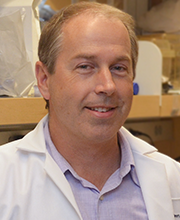Our Impact
Boston Children’s Hospital has been quietly changing the future of health for every child, here and around the world, since 1869. Named the number one hospital for care in the country, we are also the largest research center for pediatric medicine anywhere. Each year the conference proceeds benefit a new research initiative at Boston Children’s Hospital, as well as unique collaborations between Boston Children’s and the Broad Institute. Since inception in 2012, the Boston Investment Conference has generated more than $27M to accelerate the most promising research aimed at better treatments for sick children in the near term.
2024 Boston Investment Conference Awardee
More than 5% of the world’s population—432 million adults and 34 million children—have some form of disabling hearing loss, and often the causes are genetic. Restoring a person’s hearing was once considered unattainable. But today, scientists at Boston Children’s Hospital, led by Jeffrey R. Holt, PhD, are developing groundbreaking gene therapy techniques to make this dream a reality.
The team is using adeno-associated viruses (AAVs) to safely deliver healthy copies of a gene to affected cells, repairing them. Dr. Holt has used this method to restore hearing in mice with either common or rare hearing loss gene mutations. And now, for the first time, one of the viral vectors he discovered effective in the ear is being used in a clinical trial for children with the rare otoferlin gene mutation.
Last October, an 11-year-old boy who was born deaf became the first person in the U.S. to receive this gene therapy. Within months, he could hear music, sounds and people for the first time.
Gene therapies for hearing loss are not one-size-fits-all, however. There are up to 150 forms of hearing loss genes, each of which will require its own specialized treatment. But the initial success with otoferlin has given Dr. Holt’s team the momentum needed to bring treatments for two prevalent and more common hearing loss genes—TMC1 and stereocilin—closer to clinical trial. Once available, these treatments could benefit the over 2 million people worldwide with either of these gene mutations.
Dr. Holt’s team engineered a treatment that completely restored hearing in mice with TMC1 mutations, and researchers are verifying its safety in large animal models. In addition, they invented and patented a new method to deliver AAVs with sequences encoding large genes like stereocilin.
Support from the Boston Investment Conference will enable Dr. Holt and his team to conduct pre-clinical studies required by the FDA, complete the drug manufacturing process and initiate clinical trials for patients with TMC1 or stereocilin mutations within 18 months. This critical work will pave the way for restorative therapies and offer hope for more children with genetic hearing loss.

Jeffrey R. Holt, PhD
Professor of Otolaryngology and Neurology, Harvard Medical School
Department of Otolaryngology and Communication Enhancement
